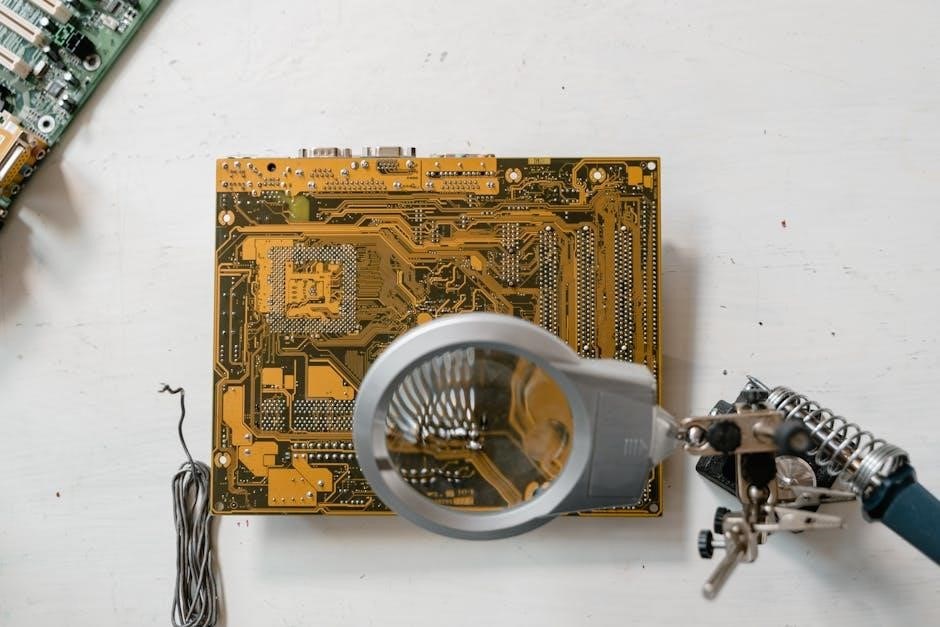
Engineering fundamentals form the cornerstone of technical education, providing essential skills in problem-solving, critical thinking, and practical application of scientific principles to real-world challenges.

1.1 Importance of Understanding Engineering Basics
Understanding engineering basics is crucial as it lays the foundation for advanced studies and real-world applications. These fundamentals enhance problem-solving skills, critical thinking, and the ability to apply theoretical knowledge practically. A strong grasp of basics supports lifelong learning in engineering’s ever-evolving field, ensuring adaptability to new technologies and challenges. It equips students with essential tools to tackle complex projects and innovations effectively. By mastering these principles, engineers can approach problems with confidence and creativity, driving progress in their respective disciplines. Thus, prioritizing foundational knowledge is vital for both academic success and professional growth in engineering.
1.2 Key Components of an Engineering Study Guide
A comprehensive engineering study guide typically includes foundational theories, practical applications, and problem-solving techniques. It should cover essential mathematical and scientific principles, such as algebra, calculus, and physics, which are critical for engineering problem-solving. Additionally, the guide should provide detailed explanations of core concepts, real-world examples, and case studies to illustrate practical applications. Exercises and practice problems are vital for reinforcing learning, while diagrams, charts, and tables help visualize complex ideas. Lastly, the guide should offer resources for further study, such as recommended readings or online tools, to support continuous learning and skill development.
1.3 Effective Learning Strategies for Engineering Students

Engineering students can enhance their learning by adopting structured strategies. Active participation in lectures, regular problem-solving, and reviewing notes are essential. Utilizing online resources, such as tutorials and forums, can deepen understanding. Time management is crucial; creating a study schedule helps prioritize tasks. Practicing past exam papers and mock tests builds exam readiness. Collaborating with peers through group study or discussions fosters a supportive environment. Additionally, seeking guidance from professors or mentors clarifies doubts and provides insights. Employing visualization techniques, like diagrams, aids in grasping complex concepts. Consistent practice and repetition reinforce retention, while staying organized ensures efficient use of resources; These strategies collectively build a strong academic foundation, equipping students to excel in their engineering studies.

Foundational Concepts in Engineering
Foundational engineering concepts include mathematics, physics, and problem-solving techniques, forming the bedrock for analyzing and designing practical solutions across various engineering disciplines.
2.1 Mathematics in Engineering: Essential Skills
Mathematics is the backbone of engineering, providing the tools to analyze and solve complex problems. Essential skills include proficiency in algebra, calculus, geometry, and statistics. Engineers use mathematical models to design systems, optimize performance, and predict outcomes. A strong understanding of mathematical principles enables the development of algorithms and simulations. Additionally, math enhances problem-solving abilities, critical for innovation and troubleshooting in engineering projects. Mastery of these skills is fundamental for interpreting data, making precise calculations, and ensuring safety in engineering applications. Without a solid mathematical foundation, advancing in engineering disciplines like mechanical, electrical, or civil engineering becomes challenging. Thus, mathematics remains indispensable for achieving both academic and professional success in engineering.
2.2 Physics and Chemistry: Core Principles
Physics and chemistry are fundamental to engineering, providing the scientific foundation for understanding the behavior of matter, energy, and physical systems. Key physics concepts include mechanics, thermodynamics, and electromagnetism, which are essential for designing and analyzing engineering systems. Chemistry plays a crucial role in understanding material properties, chemical reactions, and environmental interactions. Engineers apply these principles to develop technologies, from energy systems to advanced materials. A strong grasp of physics and chemistry enables engineers to solve complex problems, innovate, and ensure safety in their designs. These disciplines form the basis for advancements in fields like aerospace, electrical, and chemical engineering, making them indispensable for any engineering study guide.
2.3 Problem-Solving Techniques for Engineers
Effective problem-solving is a cornerstone of engineering, requiring a systematic approach to identify, analyze, and resolve challenges. Engineers employ techniques such as defining problems clearly, brainstorming solutions, and testing prototypes. Critical thinking and creativity are essential for developing innovative solutions. Utilizing tools like flowcharts and mind maps can help visualize complex issues. Collaboration and communication are also vital, as engineers often work in teams to refine ideas. Practical application of mathematical and scientific principles is key to ensuring solutions are feasible and efficient. By mastering these techniques, engineers can tackle real-world challenges with confidence, driving advancements in technology and infrastructure. Continuous improvement through feedback and iteration further enhances problem-solving skills, making them indispensable in engineering practice.

Engineering Disciplines Overview
Engineering encompasses diverse fields like mechanical, electrical, and civil engineering, each addressing unique challenges through applied sciences to create innovative solutions for global development and daily life.
3.1 Mechanical Engineering Basics
Mechanical engineering focuses on the design, construction, and use of machines, tools, and mechanical systems. It applies principles from physics, mathematics, and materials science to solve real-world problems. Core areas include thermodynamics, mechanics of solids and fluids, and kinematics. Mechanical engineers develop innovations in industries like automotive, aerospace, and manufacturing. They also work on heating, ventilation, and cooling systems. Essential skills include problem-solving, technical drawing, and proficiency in CAD software. Understanding stress analysis, motion dynamics, and energy efficiency is crucial. Practical applications range from creating medical devices to designing industrial equipment. This field requires a strong foundation in math and physics, along with hands-on experience. Effective communication and teamwork are also vital for successful project execution.
3.2 Electrical Engineering Fundamentals
Electrical engineering involves the study and application of electricity, electronics, and electromagnetism. It encompasses the design, development, and maintenance of electrical systems, including circuits, transformers, and generators. Key concepts include Ohm’s Law, Kirchhoff’s Laws, and Maxwell’s Equations. Electrical engineers work on power distribution, communication systems, and electronic devices. They also explore emerging technologies like renewable energy and smart grids. Essential skills include circuit analysis, programming, and familiarity with simulation software. A strong grasp of physics and mathematics is crucial. Practical applications range from consumer electronics to large-scale power systems. This field demands innovation, problem-solving, and attention to detail. Collaboration and continuous learning are essential for staying updated with technological advancements and industry standards.
3.3 Civil Engineering: Core Concepts
Civil engineering focuses on designing, constructing, and maintaining infrastructure and built environments. It includes roads, bridges, buildings, water systems, and public facilities. Core concepts involve structural analysis, geotechnical engineering, and materials science. Civil engineers ensure projects are safe, sustainable, and meet regulatory standards. Key skills include proficiency in CAD software, project management, and environmental impact assessment. The field emphasizes practical problem-solving and collaboration with architects and urban planners. Sustainability is a growing focus, addressing energy efficiency and resource conservation. Civil engineers play a critical role in improving quality of life and addressing global challenges like urbanization and climate change. Their work requires precision, creativity, and a deep understanding of physical and environmental systems to create durable and functional infrastructure.
3.4 Chemical Engineering: Key Principles
Chemical engineering revolves around transforming raw materials into valuable products through chemical, biological, and physical processes. Key principles include material and energy balances, thermodynamics, and transport phenomena like momentum, heat, and mass transfer. Reaction engineering, focusing on chemical kinetics and reactor design, is central to the field. Chemical engineers apply these principles to develop efficient processes in industries such as energy, pharmaceuticals, and environmental sustainability. The field also emphasizes process safety, scalability, and optimization. Proficiency in CAD software and simulation tools is essential for designing and analyzing systems. By integrating scientific knowledge with practical problem-solving, chemical engineers play a vital role in advancing technology and addressing global challenges like resource conservation and climate change.

Engineering Skills Development
Engineering skills development focuses on building technical proficiency, problem-solving abilities, and practical expertise. Key areas include technical drawing, CAD, communication, and time management, essential for professional growth and project execution.
4.1 Technical Drawing and CAD Basics
Technical drawing and CAD (Computer-Aided Design) are foundational skills for engineers, enabling precise visualization and documentation of ideas. Technical drawing involves creating detailed, scaled representations of objects using manual or digital tools. CAD software, such as AutoCAD or SolidWorks, enhances this process by allowing engineers to design, modify, and analyze 3D models with accuracy. These tools are essential for communicating designs clearly to teams and clients. Mastering CAD basics, including understanding layers, dimensions, and rendering, is critical for producing professional-grade designs. Regular practice and hands-on projects help engineers refine their drafting abilities, ensuring accuracy and efficiency. These skills are indispensable in various engineering disciplines, from mechanical to civil engineering, and are often required in industry certifications and professional workflows.
4.2 Communication Skills for Engineers
Effective communication is a critical skill for engineers, enabling them to convey complex ideas clearly and collaborate successfully with teams. Engineers must develop strong written, verbal, and visual communication abilities to present designs, reports, and solutions. Written communication includes drafting technical documents, proposals, and emails, while verbal skills are essential for meetings, presentations, and client interactions. Visual communication involves creating diagrams, flowcharts, and infographics to simplify complex concepts. Active listening and adaptability in communication ensure that engineers can understand and address diverse perspectives. Developing these skills helps engineers build trust, resolve conflicts, and deliver projects efficiently. Regular practice, feedback, and interdisciplinary collaboration further enhance communication proficiency, making it a cornerstone of professional success in engineering.
4.3 Time Management and Organization
Mastering time management and organization is vital for engineering students to balance academic demands, projects, and personal life. Prioritizing tasks using techniques like the Eisenhower Matrix helps focus on critical activities. Creating detailed schedules and using tools like calendars or planners ensures deadlines are met. Breaking projects into smaller, manageable tasks enhances productivity and reduces stress. Regular reviews and adjustments to schedules maintain alignment with goals. A clutter-free workspace and digital organization systems, such as cloud storage, prevent time wasted searching for information. Effective time management fosters a balanced lifestyle, allowing engineers to excel academically and professionally while maintaining well-being. These habits are essential for long-term success in engineering careers, where efficiency and organization are highly valued.

Tools and Resources for Engineering Study
Engineering study requires access to advanced tools and resources, including software for design and analysis, online platforms for learning, and laboratory equipment for practical applications and experiments.
5.1 Software Tools for Engineering Design
Software tools are indispensable in engineering design, enabling precise modeling, simulation, and analysis. Popular tools include CAD programs like AutoCAD and SolidWorks for creating detailed designs, while simulation software like ANSYS and SimScale allow engineers to test and optimize their designs virtually. Additionally, tools like MATLAB and Python are widely used for data analysis and algorithm development. These software solutions enhance productivity, accuracy, and innovation in engineering projects. Learning these tools is essential for students to stay competitive in the field. Online tutorials and forums provide valuable resources for mastering these applications. By leveraging these tools effectively, engineers can streamline their workflows and deliver high-quality solutions. Effective use of search engines can also help engineers find specific software for their needs, such as searching for “engineering design software” or “CAD tutorials.”
5.2 Online Resources for Engineering Students

Engineering students can leverage a wealth of online resources to enhance their learning and problem-solving skills. Websites like Coursera, edX, and Khan Academy offer free and paid courses on various engineering disciplines. Platforms such as GitHub provide access to open-source projects, fostering collaboration and innovation. Engineering forums and communities, like Stack Overflow and Reddit, allow students to discuss challenges and share solutions. Additionally, online libraries and academic databases, such as IEEE Xplore and ScienceDirect, offer access to research papers and technical articles. Many universities also provide online study guides and lecture notes. Utilizing these resources effectively can significantly improve understanding and prepare students for real-world engineering scenarios. Effective search strategies, such as using specific keywords, can help students find relevant materials quickly.
5.4 Laboratory Equipment and Safety Protocols
Laboratory equipment and safety protocols are essential for conducting experiments and ensuring a safe working environment. Common lab equipment includes oscilloscopes, multimeters, spectrometers, and various sensors for measuring physical properties. Safety protocols involve wearing personal protective equipment (PPE), such as gloves and goggles, and following proper procedures for handling chemicals and electrical devices. Understanding emergency procedures, like fire extinguisher use and spill containment, is critical. Students should familiarize themselves with lab manuals and safety data sheets (SDS) for hazardous materials. Proper use of equipment and adherence to safety guidelines minimize risks and ensure accurate experimental results. Regular training and supervision are vital to maintaining a safe and efficient laboratory environment.

Preparing for Engineering Exams
Effective study habits, consistent practice, and stress management are key to excelling in engineering exams. Regularly solving past papers and mock tests enhances problem-solving skills and time management.
6.1 Effective Study Habits for Engineering Exams

Developing effective study habits is crucial for success in engineering exams. Start by understanding core concepts thoroughly, as engineering relies heavily on foundational knowledge. Create a structured study schedule, allocating specific times for each subject and topic. Engage in active learning by solving problems, simulating real-world scenarios, and revising notes regularly. Prioritize difficult topics and break them into manageable sections for better comprehension. Use flashcards and summaries to reinforce key formulas and theories; Regularly practice past papers and mock tests to improve time management and familiarize yourself with exam formats. Join study groups to discuss challenging topics and gain new perspectives. Consistent effort and a disciplined approach ensure long-term retention and exam readiness.
6.2 Practicing Past Papers and Mock Tests
Practicing past papers and mock tests is an essential strategy for engineering exam preparation. These resources provide insights into exam formats, question patterns, and time management requirements. By solving past papers, students can identify their weak areas and focus on improving them. Mock tests simulate real exam conditions, helping students build confidence and reduce anxiety. Regular practice enhances problem-solving speed and accuracy, which are critical for engineering exams. Additionally, reviewing mistakes from past papers and mock tests allows students to refine their understanding and avoid repeating errors. This systematic approach ensures comprehensive preparation and boosts overall performance in engineering examinations.
6.3 Managing Exam Stress and Anxiety
Managing exam stress and anxiety is crucial for optimal performance in engineering exams. Students often experience heightened pressure due to the technical nature of the subject matter. Effective stress management begins with a well-structured study plan, ensuring adequate preparation without overexertion. Techniques such as deep breathing, mindfulness, and regular physical exercise can help alleviate anxiety. Additionally, maintaining a healthy diet and sufficient sleep schedule contributes to mental well-being. Positive visualization and time management strategies can further reduce stress levels. It is also important to seek support from peers, mentors, or professionals if anxiety becomes overwhelming. By addressing stress proactively, students can approach exams with confidence and clarity, enhancing their ability to succeed in engineering examinations.
Mastering engineering fundamentals requires dedication, continuous learning, and practical application of concepts. This guide provides a solid foundation, enabling students to approach engineering challenges with confidence and innovation.
7.1 Summarizing Key Concepts
7.2 Continuous Learning in Engineering
Continuous learning is vital in engineering, as the field evolves rapidly with technological advancements. Engineers must stay updated with new tools, methodologies, and industry standards. The internet serves as a powerful resource, offering access to courses, tutorials, and research papers. Utilizing search engines effectively, such as Google, allows engineers to quickly find relevant information. Techniques like keyword searching and using Boolean operators can refine results, ensuring efficiency. Additionally, staying connected with professional networks and participating in workshops enhances knowledge sharing. By embracing lifelong learning, engineers adapt to industry changes, maintain competitiveness, and contribute to innovation. This commitment to growth ensures they remain effective problem-solvers in a dynamic field.